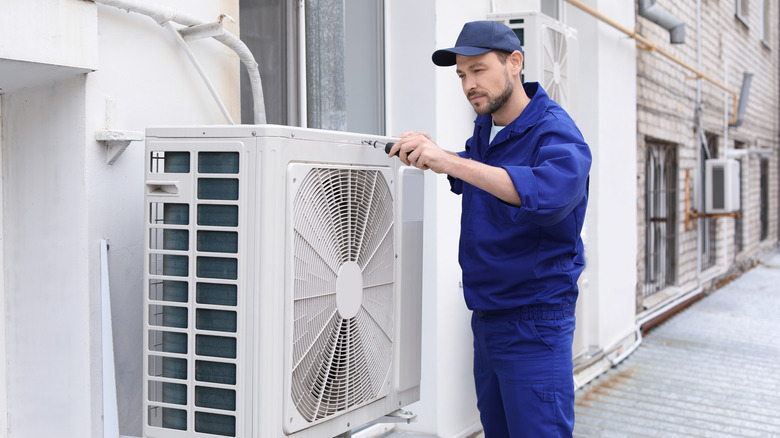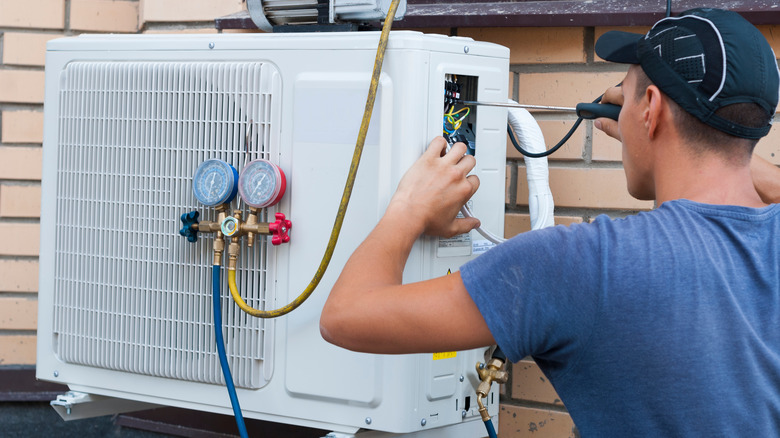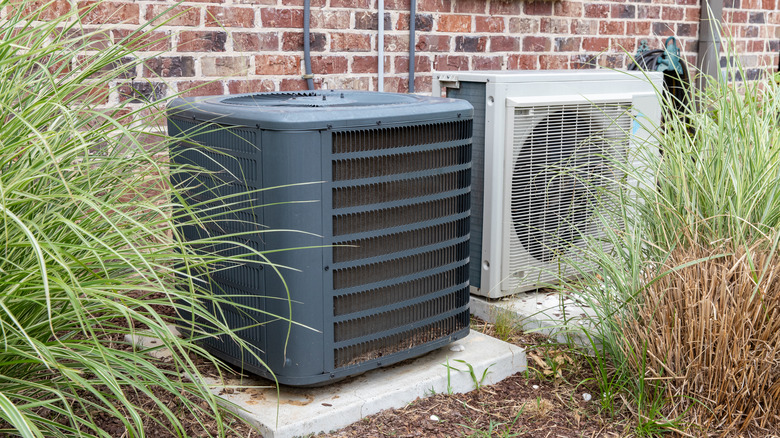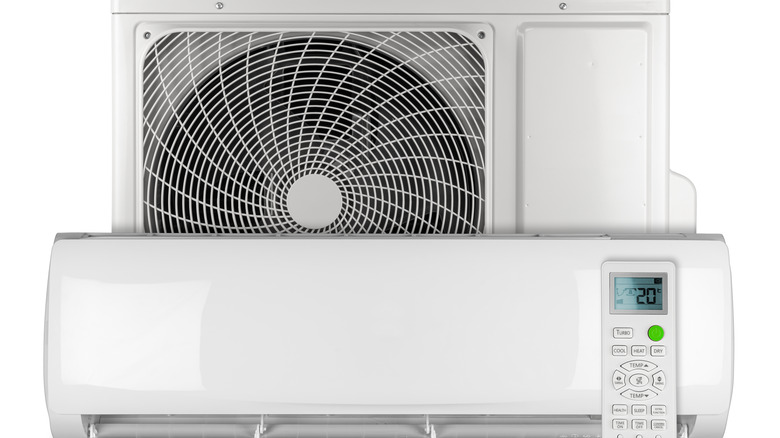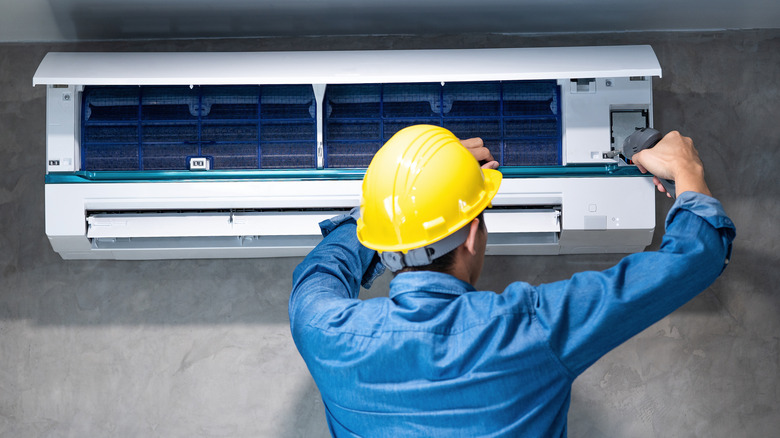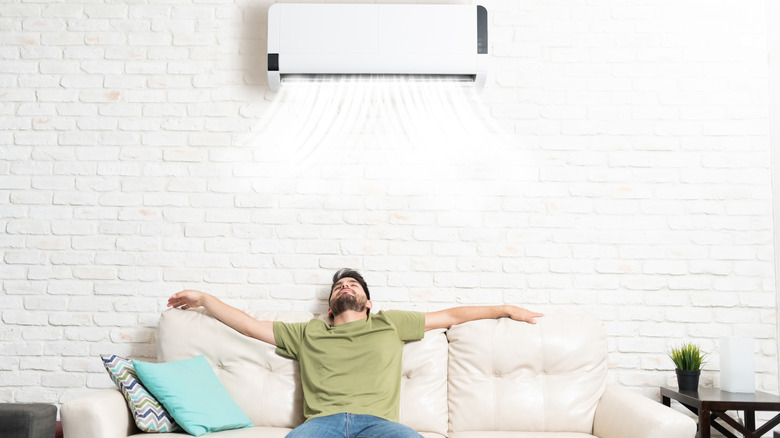How Much Does It Cost To Replace An Air Conditioning Unit?
The term HVAC stands for heating, ventilation, and air conditioning, and thus the system is made up of three major components: an outdoor furnace, ductwork, and an air conditioner. While these elements usually function in harmony with one another, it is common for one component to fail before the others, for instance, the AC unit before the furnace. In such a scenario, the best course of action is to replace the AC unit alone. While it is possible to repair the old AC, a replacement might save you from the trouble of fixing recurring problems down the line.
However, it is worth mentioning that replacing an AC unit sounds simpler than it really is, and there are plenty of factors that can affect the overall replacement cost. According to Atlas AC Repair, LLC, the average cost of new AC with a basic SEER of 14 ranges from $3,200 to $4,200. Remember, the cost may be higher depending on the factors we plan to discuss. Let's jump right in!
Factors affecting cost
If you are considering replacing your AC, then it is imperative to understand that the cost can vary widely, due to the personal requirements unique to your household's needs. Let's talk about some of these factors and how they may influence the final price, as explained by AirCo.
The system capacity
Your unique situation at home will influence the size of the AC you require. For you to know what size is right for you, your HVAC technician will do a load calculation. This test takes into consideration the size of your house and any other factors that may influence thermal transfer, such as ceiling height and the number of doors and windows. AC units with higher capacity are often more expensive, but it's important to note that bigger is not always better. According to Fire & Ice Heating & Air Conditioning Inc., an air conditioner is too big for the space, it will fail to remove moisture effectively in addition to costing you unnecessary expense.
Location
Different climates require different systems and setting to keep your home comfortable. According to Atlas AC Repair, LLC, certain systems are better suited to particular regions of the U.S., and some systems may be altogether inappropriate for the region in which you live. Be sure to do research or ask neighbors when deciding to replace your AC unit. Atlas AC Repair, LLC also advises that AC unit replacement costs typically run higher in warmer, southern regions of the country.
AC efficiency
The Seasonal Energy Efficiency Ratio rating (SEER) is another factor that will influence the cost of your replacement. While modern AC units with better SEER ratings might be more expensive to purchase initially, the overall cost of maintenance and energy bills will be lessened significantly in the long run. Another benefit of modern, efficient units is that they are less noisy, providing greater peace and quiet in your home.
Matching your HVAC equipment
If it is only the AC that has broken down, should you consider the furnace during replacement? Absolutely! Any new component of your HVAC system should be able to work in sync with the existing elements. This is particularly important if you are replacing the existing AC with a variable speed model, in which case you need a compatible heating unit. The variable speed model needs to be matched with an indoor blower that operates at different speeds, and thus you may need to upgrade your furnace or air handler motor as well.
Variable Speed
The variable speed is another important factor that will affect the cost of the particular AC unit you get. The two types are single-stage and two-stage ACs. The two-stage AC has two settings to either operate at 100% capacity, or a reduced 70%. The single-stage AC only operates at 100% capacity. It is important to mention that while single-stage AC is cheaper to replace, they are not as quiet or energy-efficient as the two-stage AC.
Additional costs
Budgeting for an AC replacement should also include additional costs that might pop up during the process, but it's only possible to factor in such costs if you're aware they exist. Luckily, this guide breaks it all down:
Insulation
The insulation in your home won't directly affect the cost of your AC replacement, but if you are having to deal with cold drafts creeping into your home during the winter months, you should consider insulation repairs as well. Poorly insulated homes have difficulty maintaining the preferred temperature, making your HVAC system work harder than it needs to and increasing your energy bills. On average, insulation cost ranges from $1,000 to $2,100, but it will save you up to 15% in monthly utility bills when done right. Bob Vila suggests that another benefit of proper insulation is that it can help reduce the temperature fluctuations that cause condensation, in turn reducing the possibility of developing mold and mildew.
Rebates
Local utility companies will occasionally issue rebates to incentivize homeowners to replace their AC unit in order to reduce overall energy costs, per Fire & Ice Heating & Air Conditioning, Inc. While manufacturers also offer rebates for certain products, they may only do so in the event of a full unit restoration that includes upgrading your thermostat as well. Still, it could be helpful if you are considering replacing your HVAC system, so make sure to check your eligibility.
Electrical work
An HVAC system replacement is a job that often involves collaboration among several trade disciplines including plumbing, carpentry, and electrical work. Electrical work may not be necessary, but in many cases, your wiring will need to be upgraded to accommodate your AC unit upgrade. When budgeting, make sure to include the electrical labor and material costs, which Sinclaire Home Services states could run you between $100 and $600.
Duct modification
The existing external air duct system may also need to be upgraded so it is compatible with the new AC model. Sinclaire Home Services explains that the type of modification necessary varies depending on the specific AC model. In these cases, the cost of doing such upgrades should range from approximately $200 to $500.
Types of AC units
When considering replacing your AC system, the first decision you have to make is the type of unit you should go for. While there are several choices for air conditioning systems to pick from, let's have a look at some of the most popular options, via American Home Water & Air.
Ductless air conditioners
This is a good option if you don't have any pre-existing ductwork in your home. Rather than relying on a system of traditional ductwork, these units work independently in each room. Each unit has a condenser that feeds directly into evaporators inside the home, and a single ductless air conditioner can work with four evaporators per house. Another advantage is the small size for easier zoning.
Window AC
This is the most common type of AC unit that you will find in most homes and commercial properties. It is popular for its more affordable price point and the fact that it is relatively easier to clean than ductwork systems. You can easily disassemble the unit to clean otherwise hard-to-reach parts. However, it is also important to highlight that a window AC is not as effective as other options, especially when installed in big houses. It is more economical to install a single unit that can meet the needs of the home, rather than relying on several smaller units.
Portable AC
Different from the aforementioned types of air conditioners, the portable type doesn't require any installation whatsoever. This stand-alone unit features a duct that can be connected to the nearest window in the room. While having a portable air conditioning unit affords you greater flexibility, you should know that it works best in small spaces. What's more, these units are far from the quietest option, so be ready to deal with some degree of noise if you decide to go the portable route.
Central AC
The central air conditioner is on another level as far as convenience and comfort are concerned. This type of AC is available in two options: packaged central air conditioners and split-system central air conditioners. The packaged central AC has the condenser, evaporator, and compressor all within the same outdoor unit. The split-system AC, on the other hand, is divided into two, with the compressor and condenser housed outdoors while the evaporator is installed inside your home. Though they are most reliable and quite convenient, the biggest drawback is the higher price. A central AC unit can be rather expensive, with prices ranging between $1,500 and $7,000.
Why do I need to replace my AC
With proper maintenance, most air conditioning units will easily last between 15 to 20 years. So why should you bother to replace your AC unit before it has outlived its purpose? Goodman Air Conditioning & Heating provides three good reasons why you should consider replacing your AC unit before it fails altogether.
Eliminate the stress of frequent repairs
Again, most AC units have a service life span of between 15 to 20 years, so if you are living in an older house then you should consider changing your AC. In most cases, repairs are cheaper than replacement, but when a problem keeps reoccurring despite frequent repairs, the best option is to replace the old unit with a new one. Having a reliable, consistent unit will undoubtedly save you time and give you greater peace of mind.
Improve energy efficiency
Different seasons bring with them different energy requirements to make your home comfortable, and thus you should expect some fluctuation in your energy bills throughout the year. However, the overall pattern should remain consistent from year to year. If you notice a spike in energy consumption that cannot otherwise be explained, it may be a sign that your AC unit is functioning at reduced capacity, or simply cannot keep up with the changing needs of your home. Units with a high SEER ratio are often the most energy-efficient and will help you save on utility bills. In any case, your HVAC technician should be able to advise you accordingly.
Eliminate noise
A well-functioning air conditioner should run smoothly without making too much noise for your comfort. In that regard, a good indication that your AC unit is malfunctioning is the production of too much noise.
Benefits of an air conditioning unit
These days, an AC unit is considered a necessity rather than a luxury, especially in warmer climates. The AC unit does more than just cool the air in our indoor spaces. One Hour Air Conditioning & Heating details some of the additional benefits an AC unit can provide:
Better working conditions
The ideal working condition for most humans is a cool environment. Excessively warm spaces can cause lethargy, not to mention irritation. With so many of us now able to work from home, having a working AC unit is more important than ever. An air conditioning unit provides just the right temperature for optimum productivity. You may find yourself able to achieve far more when working in cooler temperatures compared to trying to accomplish your work in an uncomfortably warm space.
Security
Without an AC unit, you may rely on open windows to cool your space and enjoy a warm breeze, but this increases the possibility of an unwanted guest gaining access to your home. It's generally well-known that an AC unit works best when doors and windows are closed, which provides greater security. Additionally, closed doors and windows can keep out lesser threats such as rodents and insects.
Better sleep
Trying to sleep in uncomfortably hot conditions can greatly compromise your quality of rest. Even if you find a way of finally falling asleep, you may find yourself waking hours later, drenched in sweat. An air conditioning unit provides your home with the ideal temperatures for having longer and undisturbed sleep. A proper night's rest has plenty of benefits for the human body, including better mood, thinking, and performance.
Keeps electronics from overheating
The harmful effects of extreme heat are not only exclusive to the human body. Electronics around the house run the risk of overheating and getting damaged in the process. Replacing or installing an AC will protect you, your family, and the electronics you rely on around the house.
